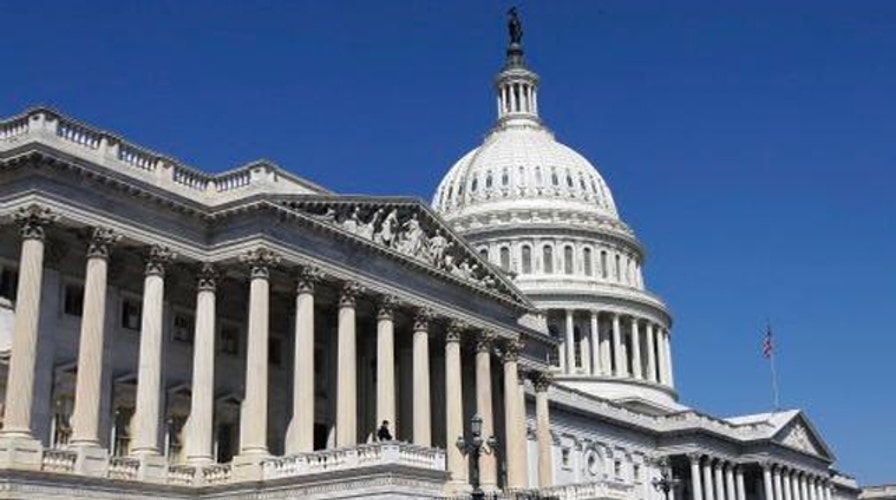Republican leaders in the House and Senate will face restless rank-and-file members Tuesday morning when they give updates on ongoing negotiations to cobble together a budget plan that would end a two-week-old partial government shutdown and increase the U.S. debt ceiling.
Senate Minority Leader Mitch McConnell, R-Ky., and Senate Majority Leader Harry Reid, D-Nev., scrambled late Monday to iron out the specifics of an emerging budget proposal after a string of prior plans fizzled.
Reid appeared on the chamber floor Monday night to announce, "We've made tremendous progress -- we are not there yet -- but tremendous progress, and everyone just needs to be patient."
McConnell added, "We've had a good day...I think it's safe to say we've made substantial progress and we look forward to making more progress in the near future."
The House GOP Conference is scheduled to meet at 9 a.m. to discuss the tentative framework of the budget proposal with members, many of whom cast a skeptical eye toward the details of the negotiations that were dripping out Monday night. The Senate Republican Conference is scheduled to meet at 11 a.m. to receive an update on negotiations.
Resistance in the House could scuttle, or at least stall, anything that emerges from the Senate.
The White House abruptly postponed a meeting with congressional leaders set for Monday afternoon, to give senators space to work.
"We're going to get this done," Sen. Joe Manchin, D-W.Va., claimed.
It's unclear whether the optimism would be matched by results. After several prior plans fell apart over the weekend, lawmakers are working on a tight timeframe. Congress, aside from grappling with the partial government shutdown, faces an Oct. 17 deadline to raise the debt ceiling. After that date, the Treasury Department warns, the U.S. government will not be able to pay all its bills.
Fox News has learned that the emerging framework would raise the debt ceiling through February, and include a spending bill meant to last through Jan. 15.
Importantly, a tentative provision to repeal or delay the medical device tax in ObamaCare has been taken out, a senior Democratic aide said. But the proposal could include other modest items pertaining to ObamaCare, including income verification for those getting subsidies and a one-year delay of at least one obscure fee which had been sought by unions.
House Republicans are watching the negotiations play out, and according to sources still want to see provisions to strip ObamaCare subsidies for congressional staff. It's unclear where they will ultimately fall, but conservative members predicted a "huge fight" if McConnell "completely capitulates."
Negotiators are still tinkering with the framework, and the details could change.
Asked earlier Monday if they were closer to a deal, Reid said: "I hope so."A McConnell spokesman said the two were "engaged in good faith negotiations and those talks will continue."
The new framework appears to be driven largely by Senate Democrats, but potentially with buy-in from McConnell.
Pressure is mounting from all sides to reach an agreement. There is fear that the financial markets could start to dive if traders lose confidence that a deal will ultimately emerge. And furloughed federal workers, now entering week three of the partial shutdown, are just now starting to see the hit to their paychecks.
But both sides of the debate were having a difficult time keeping track of what the other wants out of a deal. A standoff that began as a fight by Republicans to unravel ObamaCare is now largely a fight over spending levels -- which has emerged as a major sticking point.
After a string of budget proposals fell apart over the weekend, GOP lawmakers on Sunday pointedly accused Democrats of trying to squeeze Republicans to roll back across-the-board spending cuts known as sequester.
"I agree that Republicans started with the overreach, but now Democrats are one tick too cute," Sen. Bob Corker, R-Tenn., told "Fox News Sunday." "They are now overreaching."
He said "both sides need to come to the middle of the road."
A prior plan, fronted by Sen. Susan Collins, R-Maine, would have funded the government for six months, raised the debt limit through Jan. 31, and delayed the health care law's medical device tax.
As Reid dismissed the plan on Saturday, the dispute over spending levels escalated.
Republicans want to continue current spending at $986.7 billion and leave untouched the new round of cuts on Jan. 15 that would reduce the amount to $967 billion.
Democrats, though, want to figure out a way to undo the reductions, plus enact a long-term extension of the debt limit increase and a short-term spending bill to reopen the government.
Republicans bristled at Democrats' demands. A House Republican leadership aide said Sunday that Reid "moved the goalposts" by trying to "violate" spending levels set in the 2011 Budget Control Act.
But Democrats denied they were trying to violate those levels.
A Senate Democratic leadership aide said "the suggestion that Democrats insist on breaking the budget caps is false and belied by the facts."
Essentially, Democrats argue that they would accept current spending levels for a short period -- just not as long as Collins proposed -- so they can have another go at the sequester cuts in the near future.
Congressional sources confirmed to Fox News that the talks between Reid and McConnell are focusing on the length of the spending bill versus the length of the debt-ceiling increase. Reid wants a longer extension on the debt ceiling, but a shorter-term spending bill.
Unclear was whether any Senate deal would pass the Republican-controlled House by Thursday, though Senate Democrats were hoping momentum and the debt-ceiling deadline would pressure House lawmakers.
Fox News' Chad Pergram and Mike Emanuel and The Associated Press contributed to this report.





